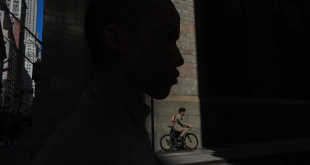Chris Hill of SPOKES, the Lothian Cycle Campaign, has revealed that Alistair Darling is potentially more pro-bike than previously hoped for.
As well being instrumental in setting up the Lothian ‘cycle team’, a Labour manifesto pledge, Darling was a councillor with David Begg, the Professor David Begg who is the chair of the government’s commission for integrated transport (and who is know to be in favour of restricting car-use for short journeys).
Hill also points out that Darling has a direct link to the Edinburgh’s transport top brass, the folks who are slowly but surely making Edinburgh less friendly to cars and more friendly to bikes and buses.
"What few outside Edinburgh will realise," said Hill, "is that [Darling’s] election agent is Andrew Burns, [who] is currently in charge of transport in Edinburgh. [Burns] is definitely pro walking/cycling and is trying to make a difference."
One way he’s trying to swing the balance away from over-dependence on cars is to bring in road-pricing. This is due to go to public consultation in Edinburgh, with a decision expected in November.
As a Scot who lives some of the year in Edinburgh, and with an election agent very much pro-bike (see below), and with links to David Begg, Alistair Darling is perhaps one of the most positive appointments (from a bike trade view) to the post of transport secretary for many years.
He’s certainly launched himself into the job with gusto. In an interview with the Finacial Times he said action must be taken to curb traffic growth and semaphored the message that his department could consider new road taxes to tackle congestion.
Darling told the Financial Times that he was not "anti-car" but that even drivers accepted there needed to be some constraint on motorists.
"It’s simply not possible to have more and more traffic on streets designed hundreds of years ago for horses and carts," he told the FT.
"People say you must be anti-car then. That’s nonsense. I drive a car. We shouldn’t be stopping people from doing what they want to, but all car drivers accept there has to be some constraint simply because we can’t all drive down one road at the same time.
"What’s without doubt is if we look at transport as a whole substantial changes are needed.
Darling said motorists needed to pay for road use.
"Everything has to be paid for one way or another," he told the FT.
He knows he’s taken on what could turn out to be poisoned chalice:
"This is one of a number of jobs in government [where] if you like adulation you’ll be bitterly disappointed. Whatever you do you’ll probably annoy a significant number of people."
PM Tony Blair has charged Darling with reviewing the likely success – or failure – of the government’s grandiose 10-year Transport Plan. This was launched with much hoo-ha early in the government’s life but much of it has hit the buffers. Congestion should be reduced by 6 percent within the next few years but, instead, congestion is increasing.
The National Cycling Strategy is also running on empty, and cycle use is sliding in the wrong direction if targets are to be met
"One of the things I’m in the process of doing at the moment is looking at the 10-year plan and making a judgment where it’s on target and where we may need to refocus what I’m going to do," Darling told the FT.
MORE ON ANDREW BURNS:
In today’s Edinburgh Evening News, Andrew Burns, Edinburgh City Council’s executive member for transport, put the case for restricting car use and promoting bikes, walking and public transport:
"[Our] plans include providing a network of pedestrian routes throughout the city to improve the convenience, safety and attractiveness of walking, and improving cycle facilities, including a comprehensive network of cycling routes and better cycle parking. There will also be a major increase in spending on maintaining the road and transport infrastructure to overcome the deteriorating standard of the road network and improve the safety and comfort of all users.
"This complete programme will be delivered prior to the introduction of any congestion charge, which will not happen until at least 2006. The investment will continue long beyond 2006 and there are detailed plans for a new tram network for the city and wider region beyond.
"Taken as a whole, this programme of investment will create a step-change in the quality and capacity of public transport on the main movement corridors for the city. A realistic alternative to the private car will be in place. Nothing I can say here will convince everyone that this will happen – only action over the coming four years will do that.
"If we are serious about ensuring Edinburgh’s continuing economic and social success for the next 20 years and beyond, and not just the next one or two, then radical innovation in terms of funding, procuring, managing and ultimately delivering transport improvements is required."
 BikeBiz Bicycle and cycling retail news
BikeBiz Bicycle and cycling retail news



